Introduction
In the quest for weight loss, motivation serves as the driving force that propels individuals toward their goals. As the journey unfolds, the integration of effective tools and strategies can transform challenges into triumphs. From leveraging innovative wellness coaching apps that offer personalized guidance to embracing community support that fosters accountability, the landscape of weight management is rich with opportunities for success.
By exploring the psychological factors that influence behavior and the importance of setting realistic goals, individuals can cultivate a sustainable motivation that not only supports their weight loss journey but also promotes overall well-being. This article delves into a variety of motivational resources, practical techniques, and the power of community, all designed to empower individuals in their pursuit of a healthier lifestyle.
Exploring Effective Weight Loss Motivation Tools
Starting your fitness path can be greatly improved with the use of different motivational resources found online, as well as the extensive features of our wellness coaching application that provide weight loss encouragement. This app serves as a central hub, providing personalized workouts, nutrition guidance, daily programming, and features like bi-weekly group calls, habit formation, and an accountability and data hub designed to help you achieve your health goals efficiently. Platforms like Etsy also provide an impressive array of resources designed to inspire and support your progress, including:
- Trackers: These invaluable tools help you in monitoring your daily food intake, exercise routines, and changes in body mass. Choose trackers that align with your lifestyle, whether you favor easy-to-use digital apps or hands-on printable formats that you can complete by hand.
- Journals: Keeping a nutrition journal is an effective method to contemplate your progress. It allows you to document your feelings and set daily intentions, which can be critical for accountability. Seek out journals that feature prompts to guide your entries and keep you motivated.
- Motivational Items: Surrounding yourself with positive reminders can elevate your spirits and commitment. Consider incorporating inspirational wall art or fitness-themed apparel into your environment to create an uplifting atmosphere.
Additionally, with the direct messaging capability of our app, you can seek personalized guidance from your health coach whenever you need it, ensuring you stay accountable and on course towards your goals. The built-in community feature connects you with like-minded individuals, providing a supportive environment that fosters weight loss encouragement and accountability. By integrating these motivational tools into your daily routine, you not only enhance your chances of success but also create a supportive atmosphere that fosters weight loss encouragement and helps you prioritize your health. Significantly, a recent survey revealed that fifty-eight percent of US participants are prioritizing wellness more than they did a year prior, emphasizing the importance of actively utilizing resources that support you in your health improvement efforts.
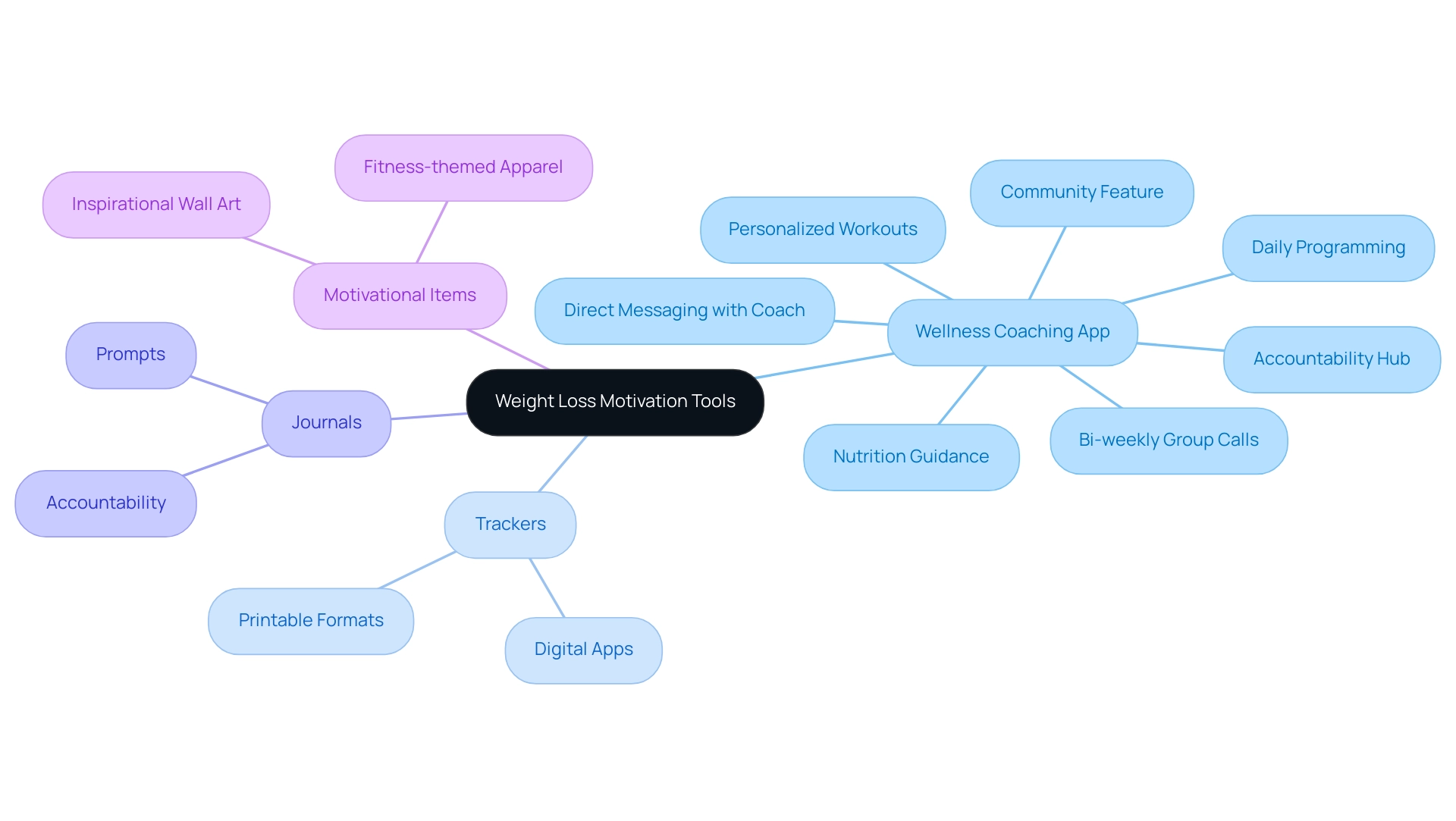
Understanding the Psychological Factors Behind Weight Loss Motivation
Weight loss encouragement transcends mere physical transformation; it is deeply intertwined with mental well-being. Research indicates that psychological factors significantly influence management of body mass, making it essential to navigate this journey with awareness and intention. Notably, 43.8% of individuals diagnosed with an eating disorder reported experiencing more than one traumatic event in their lives, underscoring the psychological complexities involved.
Key components to consider include:
- Emotional Eating: Identifying triggers for emotional eating is crucial. Keeping a journal can unveil patterns associated with stress, boredom, or sadness, allowing for proactive strategies to counteract these impulses. Current studies reveal that emotional eating is prevalent, with many individuals grappling with its challenges. In fact, a recent study reported that over 86% of competitive athletes met criteria for an eating disorder or subthreshold eating disorder, indicating a significant concern within this demographic.
- Mindset Shifts: Embracing a growth mindset is vital for sustainable success. Rather than pursuing perfection, focus on progress and celebrate every small victory. This approach not only builds confidence but also fosters resilience against setbacks. Experts highlight that weight loss encouragement through a positive attitude can greatly boost motivation and commitment to fitness objectives.
- Visualizing Success: Harnessing the power of visualization can propel you toward your objectives. Imagine yourself at your ideal figure, immersing in the feelings of accomplishment and well-being that accompany this achievement. Visualization methods have been discovered to strengthen dedication and foster a sense of purpose in the process of reducing body mass.
By addressing these psychological dimensions, you can cultivate a healthier relationship with food and your body, which provides significant weight loss encouragement and boosts your drive to achieve lasting success. Understanding the psychological landscape is not just beneficial—it is imperative for fostering a supportive environment where individuals can thrive. The case study titled "Eating Disorders in Competitive Athletes" serves as a critical reminder of the need for intervention and support in such contexts.
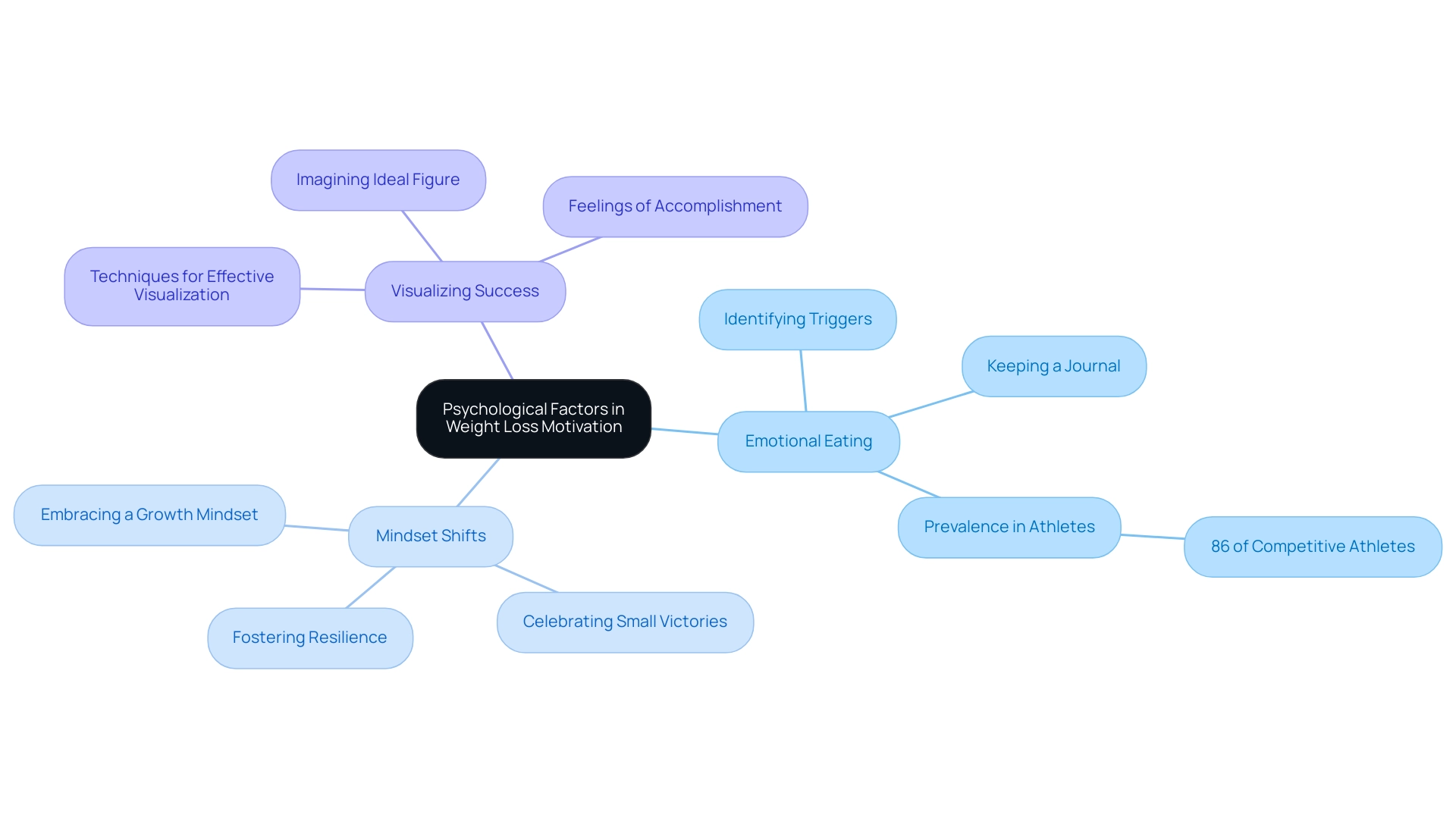
The Role of Community Support in Sustaining Weight Loss Motivation
Engaging with others on a comparable weight reduction path can greatly enhance your weight loss encouragement. Embracing community support not only fosters accountability but also creates a nurturing environment for sharing experiences and challenges. Consider these enriching options:
- Support Groups: Engage with local or online support groups where members openly share their experiences, successes, and obstacles. These discussions can provide indispensable weight loss encouragement and a sense of accountability that fuels your progress. Personalized coaching can further enhance these interactions, helping individuals make lasting lifestyle changes. One participant shared, 'The support group helped me stay on track and motivated; I couldn't have done it without them.' Given that patients with a BMI greater than 30 kg/m² or 27–30 kg/m² with obesity-related comorbid conditions may benefit from obesity pharmacotherapy, community support can play a crucial role in motivating these individuals to seek necessary interventions.
- Fitness Classes or Clubs: Explore group fitness classes or join clubs. Exercising with others not only boosts motivation but also turns workouts into enjoyable social experiences, making the process more sustainable and fun. Experienced coaches guide these sessions using evidence-based techniques, such as interval training and strength conditioning, to ensure effective engagement and results.
- Social Media Communities: Utilize platforms like Facebook or Instagram to tap into vibrant loss communities. Sharing your story and experiencing the paths of others can cultivate a profound sense of belonging and inspiration. Personalized coaching in these spaces can help individuals gain the knowledge and skills necessary for a healthier life. As one client noted, 'Posting my progress online kept me accountable and inspired to continue.'
The rise in obesity prevalence is linked to changes in the food system, as highlighted in the case study titled 'The Obesogenic Environment.' These environmental changes, along with a more sedentary lifestyle, lead to increased caloric intake and reduced physical activity, pushing individuals towards gaining mass. Community support can help alleviate these effects by promoting healthier lifestyle choices and offering weight loss encouragement through the individualized guidance necessary for enhanced well-being.
By actively pursuing and engaging in community support, you can create a strong network that offers weight loss encouragement and inspires you throughout your journey of achieving a healthier body. Remember, as one physician insightfully noted, 'So let’s figure out how we can move forward and keep getting the benefits, and I’ll be here with you to help along the way. Let’s agree on a couple of next steps, and we’ll meet again in a few weeks to see how it’s going. If we need, we can also consider additional strategies or treatments.' Together, with the right support and experienced guidance, you can make meaningful strides toward your goals. For HR Benefits Managers, initiating support programs or consultations can be a pivotal step in enhancing employee well-being and fostering a healthier workplace.
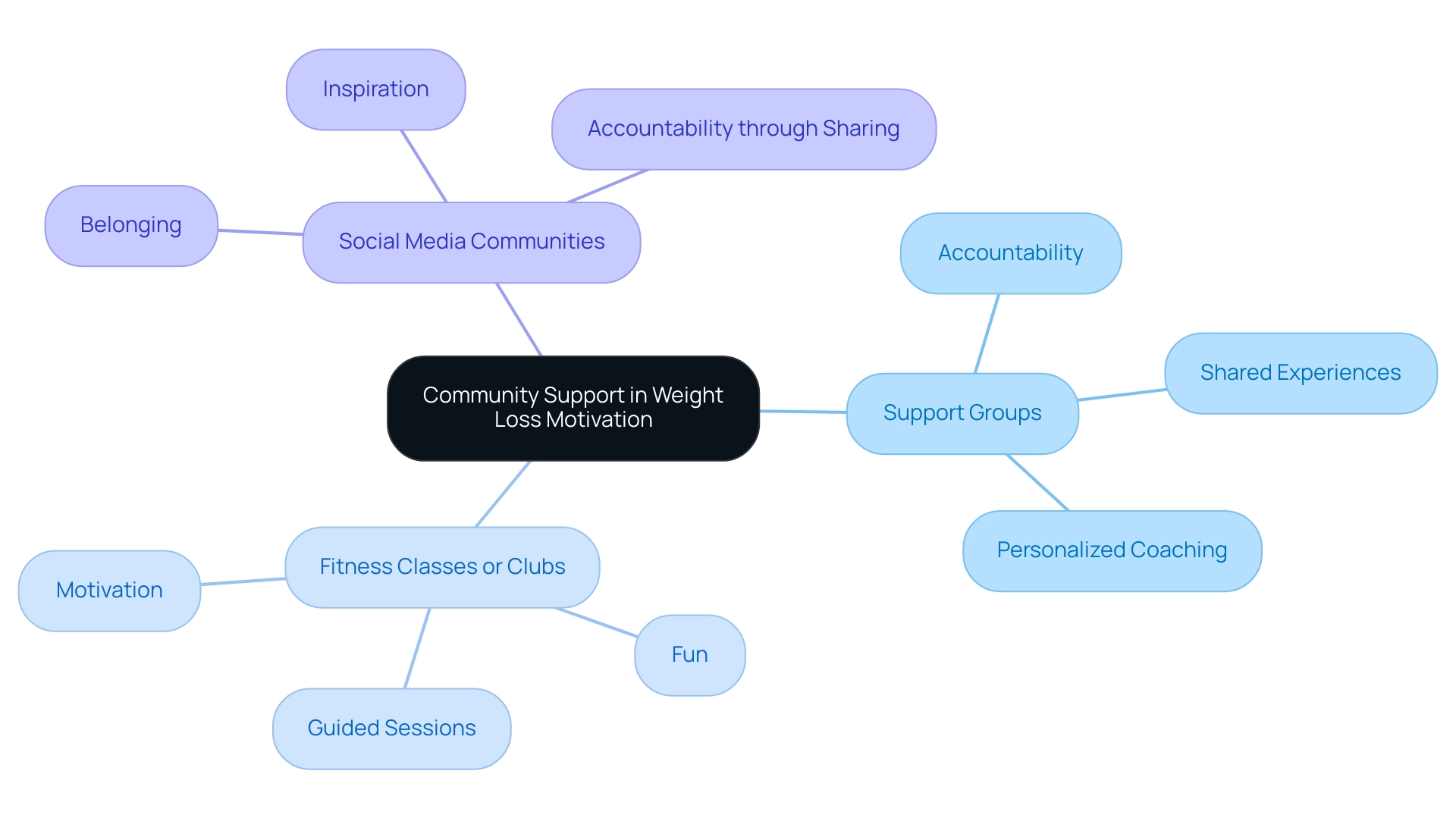
Setting Realistic Goals and Tracking Progress for Lasting Motivation
Maintaining motivation in body management depends on the establishment of realistic goals and diligent progress tracking. Here’s how to effectively implement these strategies:
- SMART Goals: Leverage the SMART framework—Specific, Measurable, Achievable, Relevant, Time-bound—to craft your weight loss objectives. For example, aiming for a reduction of 1-2 pounds weekly illustrates a realistic method that promotes steady advancement rather than excessive expectations. As noted by a consultant at Slimming World, "For a number of people, setting ambitious weight-loss targets will be motivating and meaningful."
- Progress Tracking: Documenting daily food intake, exercise routines, and body fluctuations is vital. Utilize apps or journals to create a visual representation of your progress over time. This practice not only fosters accountability but also highlights achievements that may otherwise go unnoticed. Importantly, individuals who establish more than four objectives throughout the year have demonstrated significantly greater reductions in mass, highlighting the significance of goal setting.
- Celebrate Milestones: Recognizing your successes, regardless of their size, is crucial. Reward yourself with non-food-related incentives, such as a new workout outfit or a relaxing spa day, reinforcing positive behaviors and maintaining enthusiasm for your path.
By establishing achievable objectives and consistently monitoring your progress, you foster a lasting drive for weight loss encouragement that keeps you committed to your loss journey. With 92.14% of individuals in body management programs being female, these strategies are especially pertinent for comprehending the drivers and obstacles encountered by this demographic.
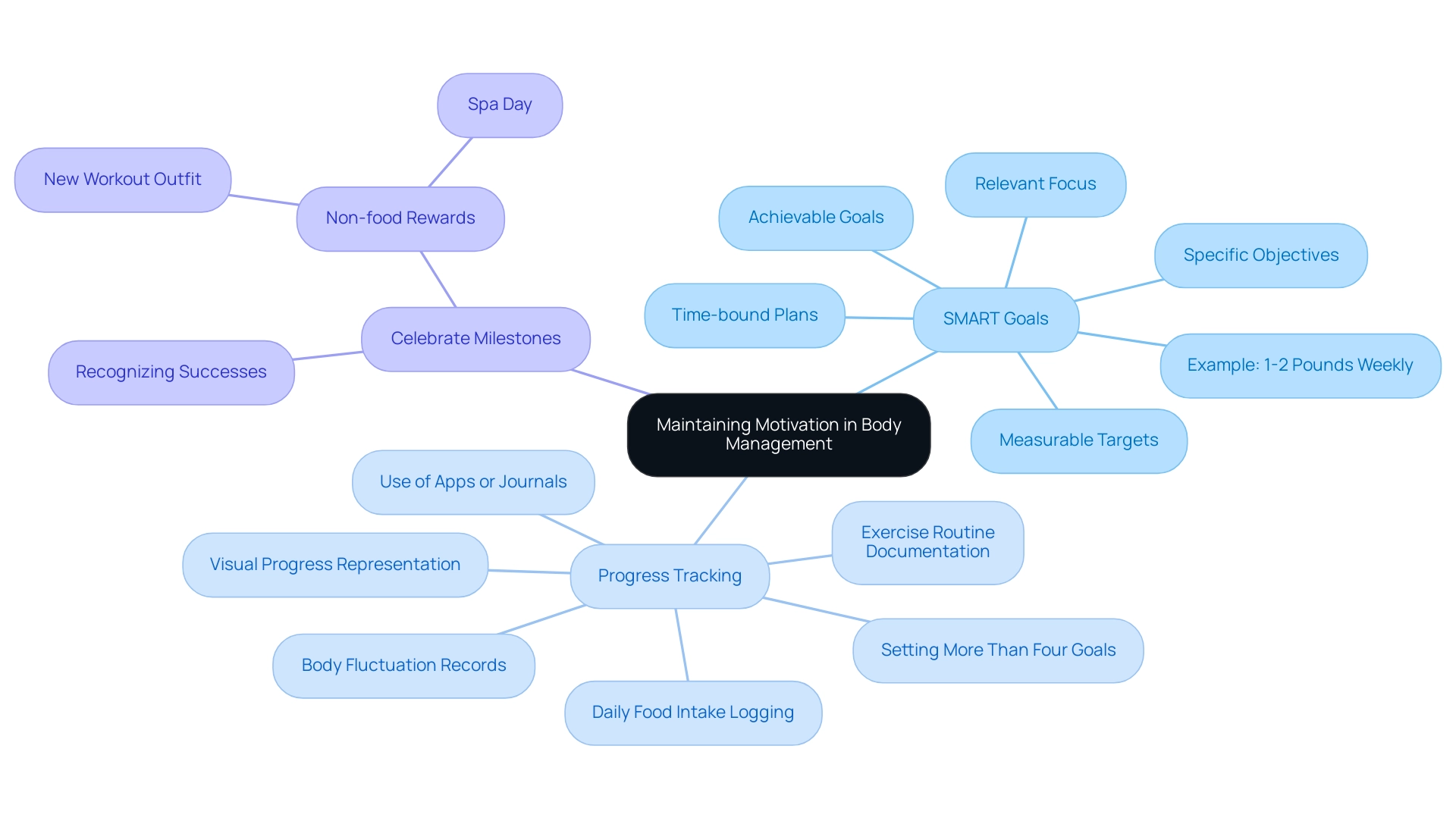
Harnessing the Power of Affirmations and Positive Reinforcement
Incorporating affirmations and positive reinforcement into your daily routine can significantly enhance your motivation, providing weight loss encouragement for managing your body. Here’s how to effectively utilize their strength:
- Daily Affirmations: Start each day with positive affirmations that align with your body transformation objectives. Statements such as,
I am capable of achieving my health goalsorI love my body and care for itact as strong reminders of your dedication. Research indicates that healing affirmations, popularized by Louise Hay, can positively influence health by reshaping your mindset. Moreover, Joseph's inquiry about subliminal suggestions highlights the potential of these affirmations to impact both conscious and subconscious levels, suggesting they could be effective in enhancing motivation. - Visual Reminders: Develop a vision board filled with motivational quotes and inspiring images that reflect your aspirations. Position it in a place where you’ll see it consistently; this daily visual cue reinforces your objectives and keeps your goals front and center.
- Positive Reinforcement: Celebrate your milestones with rewards that acknowledge your efforts. Whether it’s treating yourself to a movie night or indulging in a new book, acknowledging your accomplishments strengthens your commitment to the fitness journey. The average causal mediation effect (ACME) for self-processing ROI emphasizes the importance of positive reinforcement in behavior change, with a noted statistical effect of -0.03, underscoring the effectiveness of encouragement in sustaining drive. Furthermore, insights from the case study titled 'Whole Brain Analysis' demonstrate that heightened neural activity in regions such as the VMPFC and VS for affirmed participants reflects the significance of valuation systems during prospection, further endorsing the advantages of affirmations.
By strategically employing affirmations and positive reinforcement techniques, you nurture a positive mindset that drives your enthusiasm and provides weight loss encouragement to support the achievement of your weight loss goals. As Joseph aptly queries about the potential of subliminal suggestions, the effectiveness of these positive strategies can indeed resonate at both conscious and subconscious levels, leading to profound behavior changes. Furthermore, the work of Ward B.D. (2000) provides a scientific foundation for understanding how affirmations can influence health and motivation through documented fMRI data.
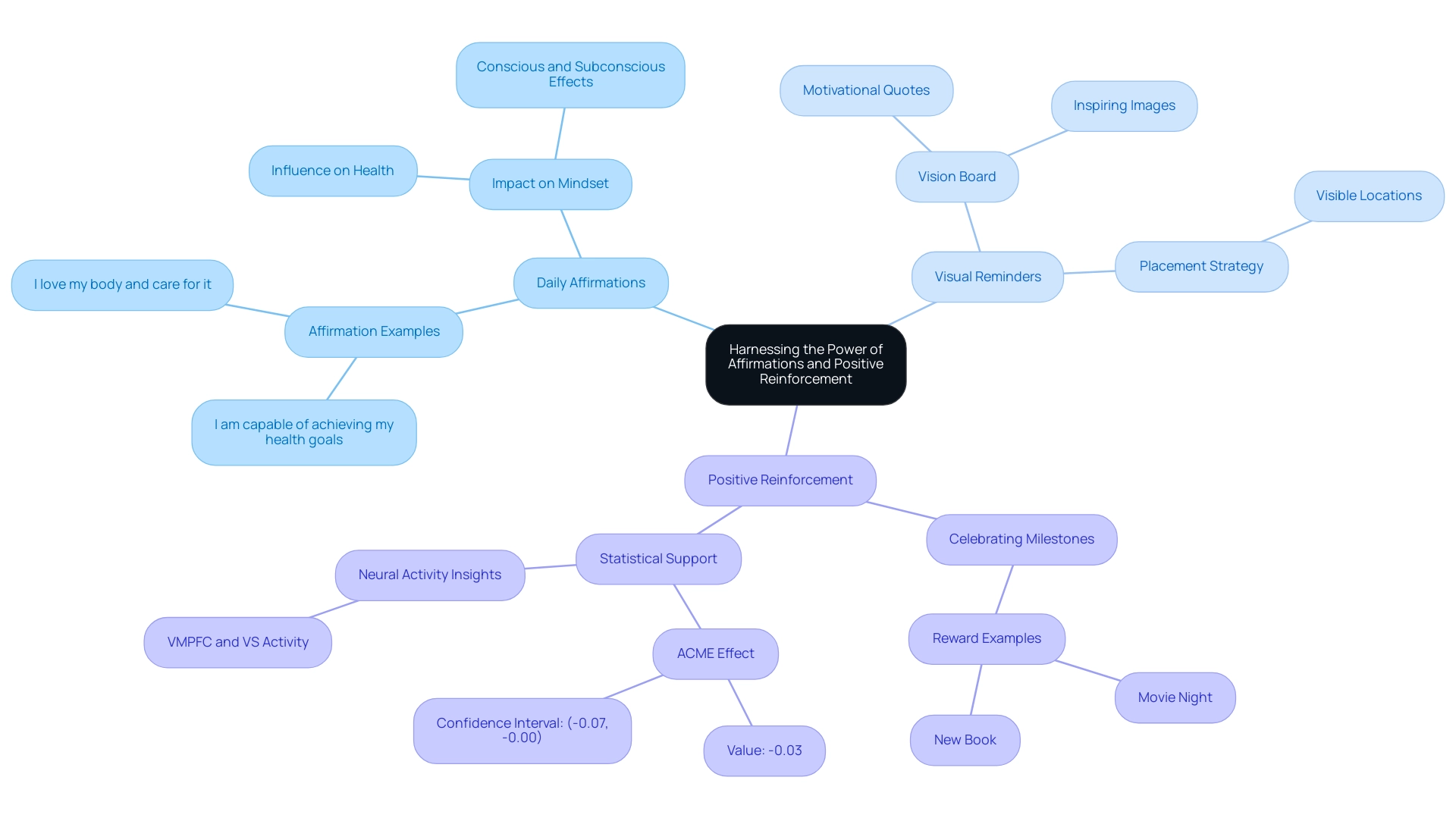
Conclusion
Embarking on a weight loss journey is a multifaceted endeavor that extends beyond dietary changes and physical activity. The integration of motivational tools, psychological awareness, community support, and goal-setting strategies plays a crucial role in fostering lasting motivation. Utilizing innovative wellness coaching apps, engaging with supportive communities, and implementing effective tracking methods can significantly enhance the journey toward a healthier lifestyle.
Understanding the psychological factors at play is equally important. By addressing emotional eating triggers, embracing a growth mindset, and visualizing success, individuals can cultivate a healthier relationship with food and their bodies. These insights empower individuals to navigate the complexities of weight loss with resilience and determination.
Moreover, the role of community support cannot be overstated. Connecting with others who share similar goals fosters accountability and encouragement, creating an environment where motivation thrives. Support groups, fitness classes, and online communities provide invaluable resources for sharing experiences and celebrating progress.
Finally, setting realistic goals and employing positive reinforcement techniques can sustain motivation over time. By celebrating milestones and utilizing daily affirmations, individuals can reinforce their commitment to their health journey. As the landscape of weight management continues to evolve, embracing these strategies will not only enhance personal well-being but also inspire others to prioritize their health and fitness goals.
Taking action now can lead to meaningful and lasting changes in the pursuit of a healthier lifestyle.




